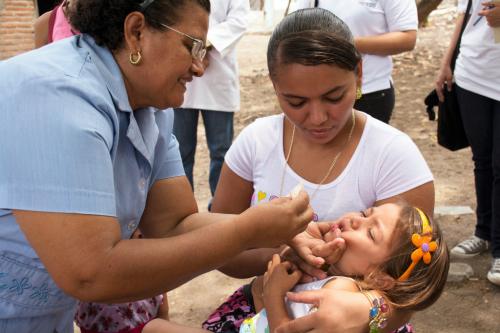UN health agency recommends large-scale deworming to improve children’s health
The suffering of those infected with parasitic intestinal can be drastically reduced with periodic deworming programmes with a single-tablet treatment, according to new guidelines approved by the United Nations health agency.

A child in Honduras being dewormed.
“There is now global evidence-based consensus that periodic, large-scale deworming is the best way to reduce the suffering caused by intestinal worms,” said Dirk Engels, Director of the Neglected Tropical Diseases Department at the World Health Organization (WHO), which also noted that such programmes can also protect the 1.5 billion people currently estimated to be at risk.
WHO aims to eliminate the harm caused by worm infections in children by 2020 by regularly treating at least 75 per cent of the estimated 873 million children in areas where prevalence is high. In 2016, WHO Member States treated 63 per cent of children requiring treatment.
“Now that the world has agreed standards for deworming at-risk populations, we are in a better position to reach this target,” Antonio Montresor, who heads WHO’s global deworming programme.
The guidelines have been approved by WHO’s Guidelines Review Committee.
Four main species of intestinal worms, also known as soil-transmitted helminths, affect almost a quarter of the world’s poorest and mostly marginalized people. The worms disrupt people’s ability to absorb nutrients and impede the growth and physical development of millions of children.
Large-scale deworming programmes use medicines donated by pharmaceutical companies. These medicines are shipped to countries requesting them, and distributed during mass treatment campaigns.
“Providing medicines to populations at risk reduces the intensity of intestinal helminth infections,” said Francesco Branca, Director of WHO’s Department of Nutrition for Health and Development, adding however that improving basic hygiene, sanitation, health education and providing access to safe drinking-water are also keys to resolving the health and nutritional problems caused by intestinal worms.
Many countries combine deworming activities for pre-school children with other health campaigns, such as vaccination, child health and vitamin supplementation days.
Source:Untied Nations
- 293 reads
Human Rights
Ringing FOWPAL’s Peace Bell for the World:Nobel Peace Prize Laureates’ Visions and Actions

Protecting the World’s Cultural Diversity for a Sustainable Future

The Peace Bell Resonates at the 27th Eurasian Economic Summit

Declaration of World Day of the Power of Hope Endorsed by People in 158 Nations

Puppet Show I International Friendship Day 2020

